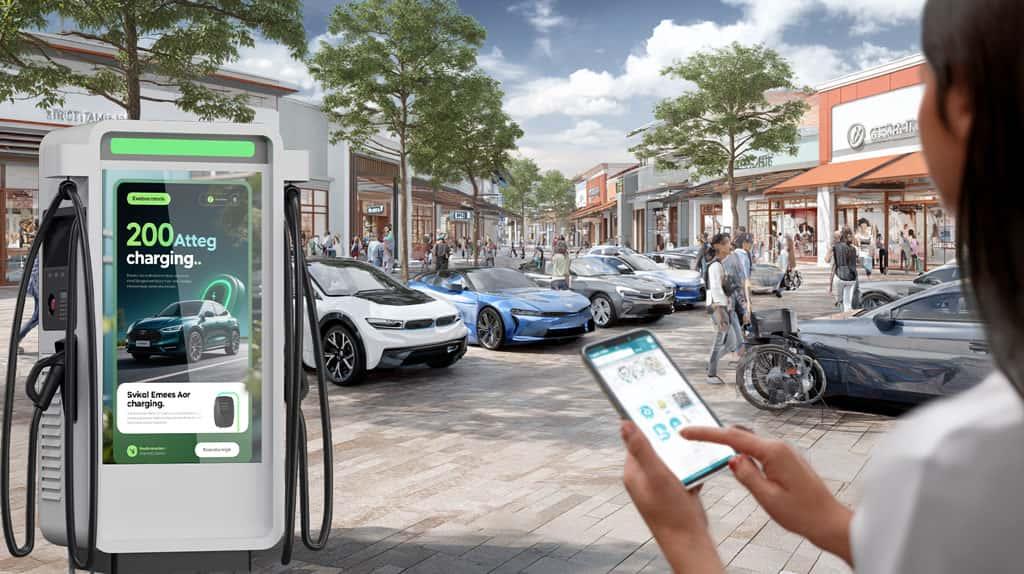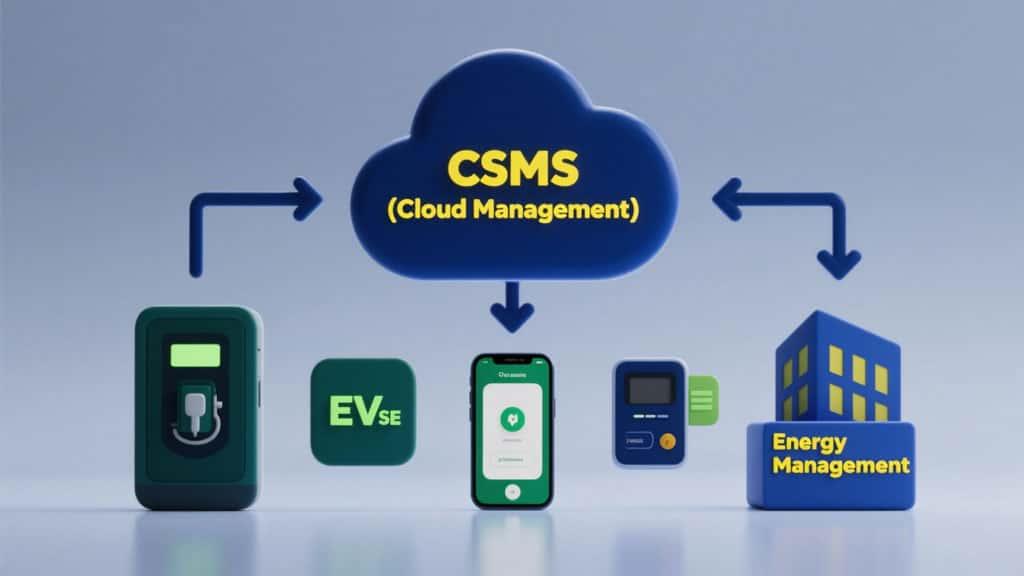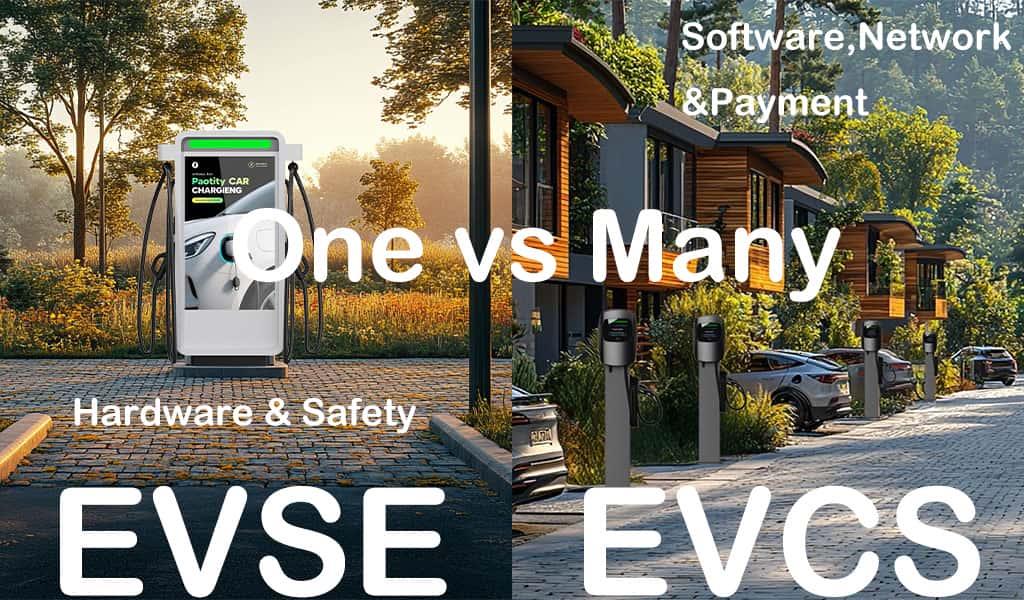
EVSE Vs EVCS Explained: The Core Of Modern EV Charging Station Design
| Core Concept | The physical device that delivers power. | The complete system providing a charging service. |
| Scope | A single piece of hardware. | Multiple EVSEs + software + network + services. |
| Primary Function | Safe power transfer. | Charging operations, management, and monetization. |
| Intelligence | Basic safety communication with the vehicle. | Networked, with remote management and smart features. |
| Key Standard | SAE J1772 (Hardware & Safety) | OCPP (Communication & Management) |
| Typical Example | A non-networked home charger. | A public charging location with multiple stalls and payment options. |
| Who Buys It? | Homeowners, electricians. | Businesses, property managers, fleet operators, CPOs. |
Why This Distinction Matters for Your Business
Using the right terminology is more than just being precise; it impacts your planning, budget, and long-term strategy.
. For Property Managers & Businesses: You are not just buying EVSEs ; you are investing in an EVCS . Your focus should be on the management software (CSMS), network reliability, and user experience. A good EVCS allows for features like load balancing, which the California Energy Commission identifies as crucial for managing building energy costs.
. For Fleet Operators: You need an EVCS to manage your fleet's charging schedule, track energy consumption per vehicle, and minimize electricity costs through smart charging.
. For Electricians & Installers: You are physically installing the EVSE units. However, you must understand how they integrate into the larger EVCS network, including data cabling and connectivity requirements.
EVSE & EVCS Standards and Connectors
Both EVSE and EVCS rely on standardized connectors to ensure cars and chargers can work together. The variety of charger connector types can be confusing, but in North America, there are three main players:
1.J1772: The standard for Level 1 and Level 2 AC charging.
2 (Combined Charging System): The standard for DC fast charging, which adds two large DC pins below the J1772 connector. Most non-Tesla EVs use this.
3 (North American Charging Standard): Developed by Tesla and now being adopted by many other automakers. It is a compact connector that handles both AC and DC charging.
The U.S. government's NEVI (National Electric Vehicle Infrastructure) program requires federal funding recipients to include CCS connectors, ensuring broad compatibility.
From a Simple Device to a Smart Energy Hub
The journey from EVSE to EVCS is the story of the evolution of EV charging itself. It has moved from a simple electrical device to a sophisticated, networked energy hub.
. EVSE is the foundational hardware .
. EVCS is the intelligent system that unlocks commercial potential and grid integration.
Understanding this distinction is the first step toward building a successful and future-proof EV charging infrastructure. As technologies like Vehicle-to-Grid (V2G) become more common, the intelligence of the EVCS will be paramount.
Ready to build your EV charging infrastructure? Whether you need robust, reliable EVSE hardware or a comprehensive, turnkey EVCS solution, our expert team is here to help. Contact us today for a personalized consultation and let's power the future of mobility together. Your success starts with the right partner.
FAQ
1. Can I have an EVCS with just one EVSE?
Yes. Even a single, networked charger that is managed by a CSMS for public or commercial use is considered a charging station (EVCS). The key is the presence of the management system, not the number of chargers.
2. Is a home charger an EVSE or EVCS? Typically, a home charger is just an EVSE . It is a standalone device designed for safe power delivery without the need for networking, payment, or remote management. However, some "smart" home chargers have app-based controls, blurring the lines slightly, but they still lack the full suite of features of a commercial EVCS .
3. What is a CPO (Charging Point Operator)? A CPO is a company that operates and manages a network of EVCS . They are responsible for the maintenance, pricing, and software of the stations. Major CPOs include companies like Electrify America, EVgo, and ChargePoint.
4. Do I need OCPP for my EVSE? If it's a simple home charger, no. If you are building an EVCS and want the flexibility to choose your management software, then yes. The U.S. Department of Energy strongly advocates for open standards like OCPP to prevent being locked into a single vendor's proprietary system.
5. What is "smart charging"? Smart charging is a key feature of an EVCS . It allows the charging speed to be adjusted based on external factors, such as grid demand, electricity prices, or the needs of other vehicles at the station. This is impossible with a basic, non-networked EVSE .
Authoritative Sources
1. U.S. Department of Energy, Alternative Fuels Data Center: Electric Vehicle Supply Equipment - Comprehensive overview of charging infrastructure.
2. Society of Automotive Engineers (SAE International): J1772: SAE Electric Vehicle and Plug in Hybrid Electric Vehicle Conductive Charge Coupler - The official standard defining EVSE hardware in North America.
3. National Renewable Energy Laboratory (NREL): Electric Vehicle Charging Infrastructure Trends - Research and data on the state of the U.S. charging network.
4. Joint Office of Energy and Transportation: Minimum Standards for Federally Funded EV Infrastructure - Official document outlining requirements, including for OCPP.
5. Open Charge Alliance: About OCPP - The home of the Open Charge Point Protocol, explaining its purpose and benefits.

Legal Disclaimer:
MENAFN provides the
information “as is” without warranty of any kind. We do not accept
any responsibility or liability for the accuracy, content, images,
videos, licenses, completeness, legality, or reliability of the information
contained in this article. If you have any complaints or copyright
issues related to this article, kindly contact the provider above.




















Comments
No comment